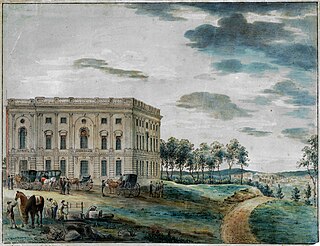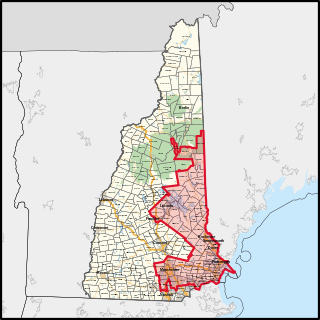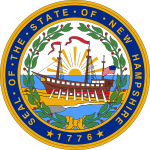
The 7th United States Congress was a meeting of the legislative branch of the United States federal government, consisting of the United States Senate and the United States House of Representatives. It met in Washington, D.C. from March 4, 1801, to March 4, 1803, during the first two years of Thomas Jefferson's presidency. The apportionment of seats in the House of Representatives was based on the 1790 United States census. Both chambers had a Democratic-Republican majority, except during the Special session of the Senate, when there was a Federalist majority in the Senate.

The 8th United States Congress was a meeting of the legislative branch of the United States federal government, consisting of the United States Senate and the United States House of Representatives. It met in Washington, D.C. from March 4, 1803, to March 4, 1805, during the last two years of Thomas Jefferson's first term in office. The apportionment of seats in the House of Representatives was based on the 1800 United States census. Both chambers had a Democratic-Republican majority.
These are tables of congressional delegations from New Hampshire to the United States Senate and United States House of Representatives.

William Plumer was an American lawyer, Baptist lay preacher, and politician from Epping, New Hampshire. He is most notable for his service as a Federalist in the United States Senate (1802–1807), and the seventh governor of New Hampshire as a Democratic-Republican.

The New Hampshire House of Representatives is the lower house in the New Hampshire General Court, the bicameral legislature of the state of New Hampshire. The House of Representatives consists of 400 members coming from 203 legislative districts across the state, created from divisions of the state's counties. On average, each legislator represents about 3,300 residents, which is the smallest lower house representative-to-population ratio in the country.

The 1802–03 United States House of Representatives elections were held on various dates in various states between April 26, 1802 and December 14, 1803. Each state set its own date for its elections to the House of Representatives, either before or after the first session of the 8th United States Congress convened on October 17, 1803. They occurred during President Thomas Jefferson's first term in office.

New Hampshire's 1st congressional district covers parts of Southern New Hampshire and the eastern portion of the state. The district contains parts of Hillsborough, Rockingham, Merrimack, Grafton, and Belknap counties; and the entirety of Strafford and Carroll counties.
Edward St. Loe Livermore, son of Samuel Livermore and brother of Arthur Livermore, was a United States representative from Massachusetts. He was born in Portsmouth in the Province of New Hampshire on April 5, 1762. Livermore pursued classical studies, studied law, was admitted to the bar and commenced practice in Concord, New Hampshire and later practised in Portsmouth.

New Hampshire's 2nd congressional district covers the western, northern, and some southern parts of New Hampshire. It includes the state's second-largest city, Nashua, as well as the state capital, Concord. It is currently represented in the United States House of Representatives by Democrat Ann McLane Kuster.
John Pickering was President of New Hampshire, Chief Justice of the New Hampshire Superior Court of Judicature and a United States district judge of the United States District Court for the District of New Hampshire. He was the second federal official impeached by the United States House of Representatives and the first person convicted and removed from office in an impeachment trial by the United States Senate.

Jeremiah Smith was a United States representative for New Hampshire, United States Attorney for New Hampshire, a United States circuit judge of the United States Circuit Court for the First Circuit, the sixth governor of New Hampshire and chief justice of the New Hampshire Superior Court of Judicature and the New Hampshire Supreme Judicial Court. He was a member of the Federalist Party.

The 1802–03 United States Senate elections were held on various dates in various states. As these U.S. Senate elections were prior to the ratification of the Seventeenth Amendment in 1913, senators were chosen by state legislatures. Senators were elected over a wide range of time throughout 1802 and 1803, and a seat may have been filled months late or remained vacant due to legislative deadlock. In these elections, terms were up for the senators in Class 1.

New Hampshire held its election August 29, 1814.

A special election was held in New Hampshire's at-large congressional district on August 30, 1802, to fill a vacancy left by the resignation of Joseph Peirce (F) earlier that year.
A special election was held in New Hampshire's at-large congressional district on August 25, 1800 to fill a vacancy left by William Gordon (F) resigning to accept an appointment as New Hampshire Attorney General on June 12, 1800.

The 2016 United States House of Representatives elections in New Hampshire were held on November 8, 2016, to elect the two U.S. representatives from the state of New Hampshire, one from each of the state's two congressional districts. The elections coincided with the 2016 U.S. presidential election, as well as other elections to the House of Representatives, elections to the United States Senate and various state and local elections. The primaries were held on September 13.

The 1802 New Hampshire gubernatorial election took place on March 9, 1802. Incumbent Federalist Governor John Taylor Gilman won re-election to a ninth term, defeating Democratic-Republican candidate, former Governor and U.S. Senator John Langdon.









